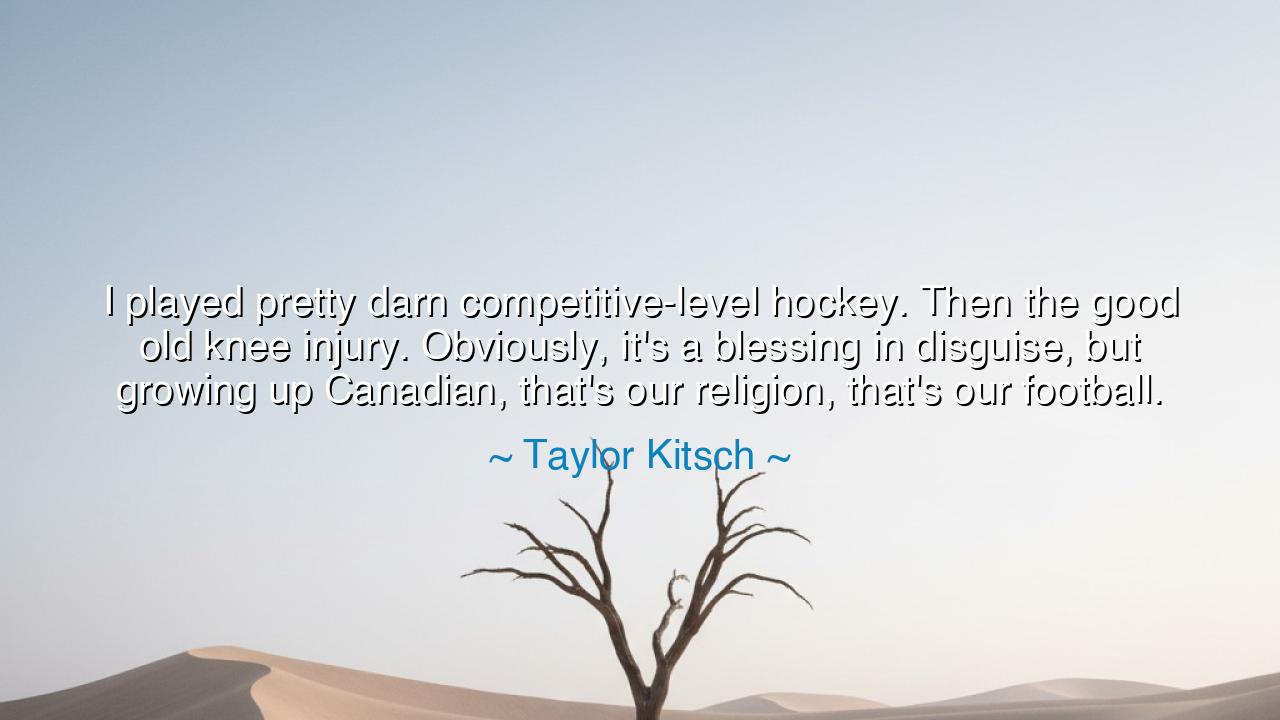
I played pretty darn competitive-level hockey. Then the good old
I played pretty darn competitive-level hockey. Then the good old knee injury. Obviously, it's a blessing in disguise, but growing up Canadian, that's our religion, that's our football.






"I played pretty darn competitive-level hockey. Then the good old knee injury. Obviously, it's a blessing in disguise, but growing up Canadian, that's our religion, that's our football." – Taylor Kitsch.
In this reflection, Taylor Kitsch offers a glimpse into the cultural heart of Canada, where hockey is not just a sport but a deep identity, a ritual woven into the very fabric of life. To play competitive hockey in Canada is to be a part of something greater than oneself, something transcendent. It is, in Kitsch's words, “our religion”, a sacred tradition passed down through generations, celebrated on frozen lakes, in arenas, and in the hearts of all who wear the maple leaf. For Kitsch, a knee injury that interrupted his path to greatness in the sport becomes a moment of reflection, a blessing in disguise that forces him to confront life beyond the game.
The ancients understood the deep connection between culture and identity—how the rituals, customs, and practices of a people shape their very essence. The Greeks, for example, placed athletics at the heart of their society, particularly through the Olympic Games, which were not just competitions but religious ceremonies honoring the gods. For the Spartans, their rigorous military training was a reflection of their way of life—every battle, every victory was an extension of their spiritual devotion. The very idea of competition was seen as a form of honoring one's people and heritage. In much the same way, for Canadians, hockey is not just a pastime—it is a celebration of their identity and national pride, a sacred bond that ties the individual to the community.
Taylor Kitsch’s mention of hockey as “our religion” reflects the significance of this sport in Canadian culture. Hockey represents not just physical prowess, but spirit, community, and sacrifice. It is about more than just the game; it is about representing one's country, one’s family, and the collective identity of a nation. In this way, hockey is both a sport and a symbol of the strength, unity, and resilience of Canadians. It is a vehicle through which they express their pride, their will to overcome obstacles, and their capacity to achieve greatness.
Consider the example of Wayne Gretzky, often regarded as the greatest hockey player to have ever lived. Gretzky was not simply an athlete; he was a living embodiment of the Canadian spirit and an icon who transcended the game. His every move, his every play on the ice, was a manifestation of Canadian identity, a nation’s pride reflected in one man’s extraordinary skill and determination. His success, along with the success of countless other players, shaped the culture of hockey and cemented its role as Canada’s national treasure. However, like Kitsch, even Gretzky faced the reality of physical limitations—his own journey was filled with injuries, sacrifices, and moments of self-reflection.
Yet, it is in the struggle—in the moments when life demands something different from us—that we find the deeper meaning of Kitsch’s words. The knee injury Kitsch suffered could have been seen as a cruel fate, the end of a promising career. However, he describes it as a “blessing in disguise”—a turning point that forced him to reconsider his path. The injury, while painful, opened the door to other opportunities, allowing him to explore new facets of life and identity. Just as the ancients knew, it is often through hardship and suffering that we find the true depth of our character. In Greek mythology, the hero Heracles had to endure twelve labors, each of which tested his strength, resilience, and ingenuity. Through these trials, he proved not just his physical might, but his ability to grow and evolve through adversity.
The lesson from Kitsch’s words is profound. Life, like hockey, is full of moments where we are challenged, where the game seems stacked against us. Whether it is an injury, a failure, or an unforeseen obstacle, these trials force us to confront who we are and who we can become. Hockey, for Kitsch, was his passion, but the knee injury became a moment of personal transformation. Just as the ancients saw hardship as a vehicle for growth, Kitsch’s experience encourages us all to view adversity as an opportunity to explore new paths, to reframe our lives, and to recognize that we are more than the roles we play in the world.
In our own lives, we too must be willing to embrace the unexpected—to look at the trials we face not as obstacles, but as opportunities for growth. Whether our “game” is in sports, work, or personal relationships, we must remember that our identity is shaped not only by our successes, but by how we handle the challenges and setbacks that come our way. By seeing adversity as a chance to evolve, just as Kitsch did with his knee injury, we can transform our circumstances into the blessings that ultimately lead to a fuller, more complete life.






AAdministratorAdministrator
Welcome, honored guests. Please leave a comment, we will respond soon